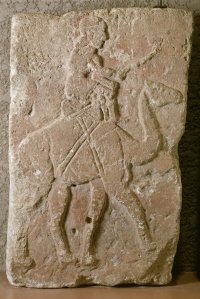By: Hanna Hajjar
As a person interested in history, I came upon a very interesting finding that seems to be common amongst all nomadic Bedouin tribal nations. However before describing this finding, let me describe the opposite so you can understand my point by comparison.
Civilization is built when a group of people settle in one location, and to be able to do that they need to sustain themselves and their economy. Hence Civilization starts with nations that practice agricultural, because agriculture gets them attached to the land, and agriculture supplies them with the food they need, and later export of excess harvest, of course that need abundance of irrigation water, hence early civilizations sprouted along river banks. There cities grow next to agricultural lands and eventual civilization prospers. Agriculture was first discovered in northern Mesopotamia, and that is where Ashur, Nineveh, and Erbil were founded and flourished as great cities, as early as 7000 years ago, and even earlier.
On the other hand, nomadic and Bedouin tribal people rely on hunting or herding. For hunting they need to be close to a land where game is abundant such as forests, while for herding they grazing land and water for their flocks; however they are constantly on the move seeking new grazing land and or water holes depending on the climate. Hence they are tent dwellers, constantly dismantling and hoisting their tents as they move around. Then there is the third group of nomad who are marauder invaders who don’t do anything other than invading other tribes and/or villages pillaging and killing then forcefully taking what they need, namely food and the possession of the invaded people.
Having said that, we notice that nations like Assyrians, Egyptians, Persians, Greeks, Romans started with agriculture societies in their homeland and then built cities like Nineveh, Thebes, Persepolis, Athens, Rome, then expanding and turning their capitals into cosmopolitan cities and centers of civilization centers of art, culture music, etc. On the other hand here is what I found common amongst nomadic Bedouin tribal peoples:
1. They start as nomad tent dwellers.
2. They constantly move around, and/or migrate.
3. They rely on invading other people, and/or they act as mercenaries to other people.
4. They have haven’t built civilized cities/capitals in their original homeland.
5. When they invade and conquer, or creep into and squat in neighboring countries, they take over existing cities, then they turn it into their capitals. Additionally where there are no existing cities they don’t bother to build one from scratch since they don’t know how. Or they force the indigenous people to build them a city.
6. Their leaders don’t stay in their original homeland because there is nothing there other than bunch of old tents there. They indulge into the riches of the conquered cities.
7. To disassociate an existing city that they had taken over from its previous history and its indigenous people, they change its original name and call it by a new name.
8. The nomad invaders are paranoid of the indigenous people, because they are afraid that one they might reclaim their ancestral homeland. So they discriminate against indigenous people, try to ban the indigenous language, and try to erase their historical and cultural heritage, in order to dissolve them into a new identity identical to the invader’s identity.
9. In order to be able to complete their take over, they also try to massacre the adult males and take their women and children.
The above nine points are common to all nomadic and Bedouin tribal people, and below are six example:
Aramean Tribes: Their homeland is the Syrian Desert (Bilad Al-Sham) which is south of modern Syria and Jordan in the Levant. The Arameans didn’t build Damascus, Aleppo, Ebla, Mari, Hama, etc. all those cities were existing and prosperous cities long before the arrival of Arameans in the region, the Arameans just crept into those cities when the Hittite Empire collapsed creating a power vacuum, and giving the Aramean a golden opportunity for a quick take over. In other words Arameans aren't the indigenous people of Upper Mesopotamia, not even north of modern Syria. They took over Dimashqu and renamed it as Darmsuq.

Note: Aramean nomad with his camel from the site Tell Halaf
Hebrew Tribes: Their homeland is southern Mesopotamia ( Ur). They invaded the land of Canaan, and took over the city of Shalim, and renamed it as Ur-Shalim (Jerusalem). Combining the original Canaanite name of the city with the name of the city that the Hebrews came from. Noting that Ur was built by the Sumerians and not by the Hebrews.
Chaldean Tribes: Their homeland is southern Mesopotamia, specifically the coastal region of the Persian Gulf, they were also known as Sea People. They took over Babel, and made it their Capital, (noting that Babel existed for thousands of years earlier and before the arrival of Chaldeans). It might be that they changed the name of Babel to Babylon.
Arab Tribes: Their homeland is the Arabian Peninsula. When the Arabs conquered the Middle East and North Africa, the Umayyid Arabs took over an existing city Damascus (Dimashqu that was Aramized earlier as Darmsuq) and changed its name to Sham, and made it their capital. Later Abbasid Arabs moved the capital to Bagdadu (later Bet-Ghadad) and renamed it Baghdad.
Turkic Tribes: Their homeland is central Asia. They were hired as mercenaries by the Abbasid Arabs, they grabbed power and expanded up taking over Constantinople making it their capital, and then changed its name to Istanbul.
Kurdish Tribes: Their homeland is India. The Kurds migrated to the Middle East, and were used by the Turks as mercenaries, who gave them a free hand in Mesopotamia on the expense of Assyrians. Almost a decade ago, the allied forces created a no fly zone along the latitude 36 degrees, not allowing the Iraqi army to move north, that gave the chance to the Kurds to consolidate their occupation of north Iraq (the heartland of Assyria). They took over Erbil (originally Erbilu) and changed its name to Hewlar, making it their capital, and Erbilu had existed for thousands of years before their arrival.






